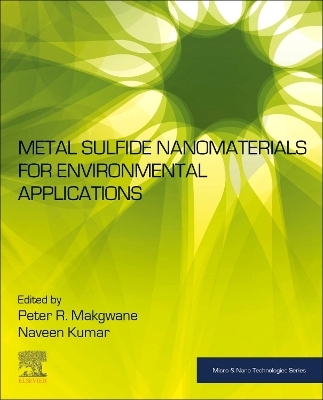
Metal Sulfide Nanomaterials for Environmental Applications
Elsevier - Health Sciences Division (Verlag)
978-0-443-13464-7 (ISBN)
Peter R. Makgwane is a full professor at the University of South Africa, Institute of Catalysis and Energy (ICES) of the College of Science Engineering and Technology. He previously worked as a Principal Scientist at the Council for Scientific and Industrial Research (CSIR) in South Africa and as a scientist for SASOL. He earned his MSc in Chemistry from the University of Pretoria, South Africa, in 2006 and his Ph.D. in Chemistry from Nelson Mandela University, in 2010, specialising in heterogeneous catalysis. He has held visiting scientist positions at the Polish Academy of Sciences Institute of Physical Chemistry (PAS-IPC), Poland, in 2017, and the National Research Centre, Egypt, in 2026. Prof. Makgwane has authored numerous books and articles in the field of catalysis and photocatalysis, with specific applications in renewable chemicals conversion, environmental remediation, energy, and semiconductor gas chemical sensing. Dr. Naveen Kumar has 18 years of research experience and is currently working as Associate Professor in Department of Chemistry, Maharshi Dayanand University, Rohtak, India, while holding other academic positions in the same institute. He is actively engaged in the field of material chemistry, with photocatalysis and luminescent materials as the focus of his research activities. He has published more than 55 articles in journals of high repute. At the Universitat Politècnica de València, Spain, he also participated in an international research project, Development of a new generation CIGS-based solar cells [NANICIS-269279], in 2013 and 2014. He has been appointed as a reviewer for various reputed journals and was invited as guest editor by MPDI Catalyst (2021) for an issue on nanocatalysis and photocatalysis. He has presented research papers at national and international conferences and delivered lectures at various institutes. He is presently also working as a book editor for both Elsevier and CRC Press/Taylor & Francis Group.
Part 1. Fundamentals of Metal Sulfide Nanomaterials
2. Substitutional structural modifications and optoelectronic properties of metal sulphide
3. Defects and band gap engineering in metalsulfides heterostructure nanomaterials
4. Conventional synthetic routes and structural characterization of metal sulphide nanomaterials
5. Advances in biogenic synthesis of metal sulfide nanomaterials
Part 2. Detection and Monitoring of Environmental Pollutants
6. Metal sulfide nanomaterials for gas sensing
7. Metal sulfide-based electrochemical sensors for the detection of organic water contaminants
8. Metal sulfide nanomaterial composites for electrochemical detection of heavy metal ions
Part 3. Removal of Environmental Pollutants
9. Interface dynamics in metal sulphides and metal oxides for photodegradation of organic contaminants
10. Carbon-metal sulfide nanomaterial photocatalysts for environmental remediation
11. Metal sulfide nanomaterial-based photocatalysts for remediation of gaseous air pollutants
12. Hybrid metal sulfide nanomaterials for the removal of heavy metal water contaminants
13. Recent advances in metal sulphide nanomaterials for antimicrobial activity and disinfection self-cleaning
14. Advances in sulfur-doped nanomaterials for environmental remediation
| Erscheinungsdatum | 26.11.2024 |
|---|---|
| Reihe/Serie | Micro & Nano Technologies |
| Verlagsort | Philadelphia |
| Sprache | englisch |
| Maße | 191 x 235 mm |
| Gewicht | 450 g |
| Themenwelt | Naturwissenschaften ► Biologie ► Ökologie / Naturschutz |
| Naturwissenschaften ► Chemie | |
| Technik ► Elektrotechnik / Energietechnik | |
| Technik ► Umwelttechnik / Biotechnologie | |
| ISBN-10 | 0-443-13464-2 / 0443134642 |
| ISBN-13 | 978-0-443-13464-7 / 9780443134647 |
| Zustand | Neuware |
| Informationen gemäß Produktsicherheitsverordnung (GPSR) | |
| Haben Sie eine Frage zum Produkt? |
aus dem Bereich


